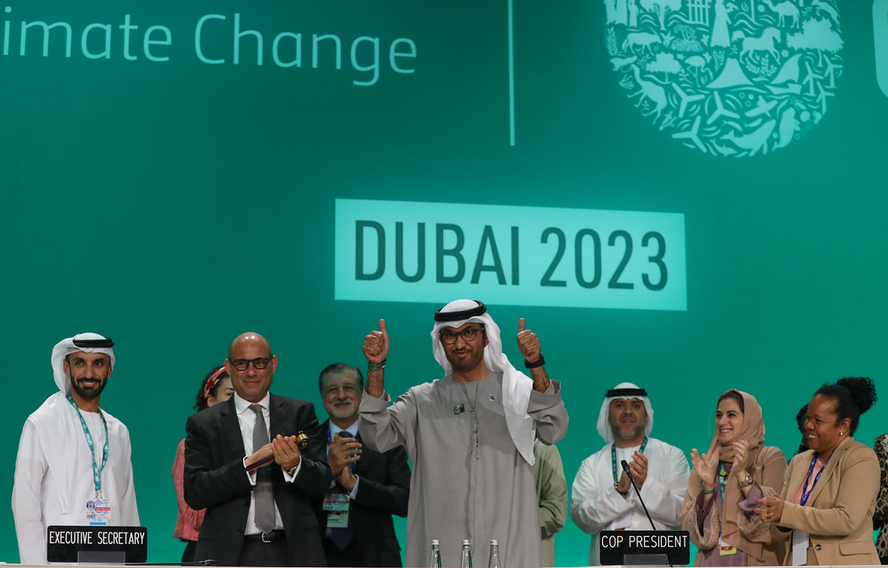
Just weeks after COP28, ADNOC’s oil and gas expansion plans “gain momentum”
Just weeks after the COP28 climate talks finished, it is business as usual for the host country, the United Arab Emirates, in expanding its oil and gas production.

C:UNFCCC
Just weeks after the COP28 climate talks finished, it is business as usual for the host country, the United Arab Emirates, in expanding its oil and gas production.
The climate talks were widely criticised when it was announced that Sultan Al Jaber, the CEO of the Abu Dhabi National Oil Company, or ADNOC for short, would also head the COP28 talks.
Towards the beginning of COP, Sultan Al Jaber sparked further outrage when he claimed there was “no science” indicating that a phase-out of fossil fuels is needed to restrict global heating to 1.5°C. The remarks were widely condemned by scientists and climate activists.
And ADNOC is continuing to ignore climate science. Yesterday, Upstream, an industry magazine, reported that ADNOC’s oil and gas expansion projects were “gaining momentum.”
The state oil company is spending billions of dollars expanding its oil production capacity from four million barrels a day (bpd) to 5 million bpd by 2027.
ADNOC has awarded a key offshore contract to a fellow UAE company to construct an artificial island near its ‘Al Nouf’ oilfield, which started production in 2005. ADNOC is planning to increase output from the field and increase production of unconventional oil and gas, including sour gas.
These expansion plans are not unexpected. OCI’s research has shown that the UAE has some of the biggest plans for new oil and gas extraction in the world. Among all companies, ADNOC is set to be the second biggest expander of oil and gas extraction in the near term. One analysis by Global Witness estimated that ADNOC could be on course to increase emissions from its oil and gas operations by more than 40 percent by 2030 compared to 2023 levels.
But they are still fundamentally at odds with the demands from climate scientists and energy experts who have repeatedly stated that we cannot afford to expand oil and gas production if we want a livable future. Last year, the International Energy Agency reported that there “is no need for investment in new coal, oil and natural gas.”
Speaking at the time, my colleague, Kelly Trout, said: “To limit global temperature rise as agreed upon internationally, there’s no room for new oil, gas, or coal fields.”
UN Secretary-General, António Guterres, also warned that countries must progressively phase out fossil fuels, “moving to leave oil, coal, and gas in the ground where they belong,” and massively boost investment in renewable energy instead.
ADNOC is simply ignoring such warnings.
The controversial oil company is also expanding its investment in dangerous distractions from what is truly needed for a livable future. ADNOC has long championed “carbon capture” as a climate solution, including at its landmark Al Reyadah plant, designed to capture emissions from the Emirates Steel plant.
The company has repeatedly said it captures 800,000 tonnes of CO2 per year. But that is highly questionable. An OCI analysis published last year found that the CCS plant is only designed to capture around 17% of the steel plant’s total CO2 emissions at full capacity.
In addition, this calculation does not consider that the CCS plant generates 10% “parasitic” CO2. This refers to emissions from the CO2 compressors and other carbon capture facilities. So, at best, the plant is capturing 720,000 tonnes. And what CO2 is captured is sent for Enhanced Oil Recovery – a process where the captured CO2 is used to extract oil from old wells that would otherwise be left in the ground, helping the company produce more oil.
Such criticisms have not stopped ADNOC from investing even more in failing technologies. Earlier this month, the company acquired a 10.1% stake in London-based carbon capture developer Storegga, leading the development of the Acorn project in northeast Scotland.
Last year, the UK Government selected Acorn as one of the schemes that would secure public funding, leading to criticism from Friends of the Earth (FoE) Scotland, which accused the government of “greenwashing.”
A spokesperson for FoE Scotland said: “Instead of handing more money to polluters, it is time to redirect that investment to climate solutions that we know can deliver emissions cuts and improve people’s lives today – such as improving public transport and insulating people’s homes to help with energy bills.”
Press attention this year has swung to the petro-state of Azerbaijan, which will host COP29. The Azerbaijan government has a track record of human rights violations and is accused of war crimes in relation to its military actions in the disputed Nagorno-Karabakh region.
Yesterday, it was revealed that the country has just appointed a committee of 28 men and no women to oversee the talks, in a move that was condemned as “regressive.” And yet again an oil man has been appointed to head the talks.
In response my colleague, Collin Rees said: “We must shift away from the business as usual that’s threatening lives and wrecking the climate,” adding that the COP process should be “free of fossil influence, including real conflict-of-interest policies to keep fossil interests from co-opting the talks.”
As Azerbaijan’s actions come under ever-increasing scrutiny this year, the global community should continue to challenge ADNOC’s massive oil and gas expansion plans.
